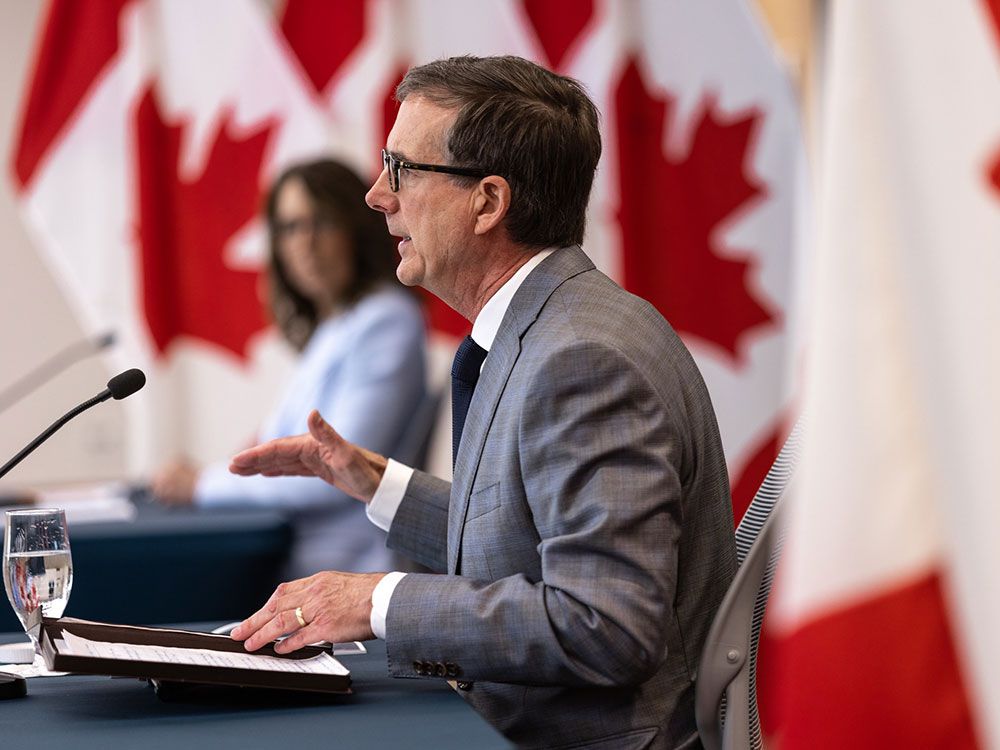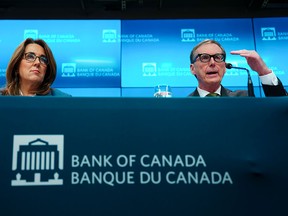Bank of Canada holds interest rate at 5% for fifth straight meeting

Rates unlikely to come down as fast as they went up, says governor

Article content
The Bank of Canada held its key overnight interest rate at five per cent Wednesday, with governor Tiff Macklem declaring it’s “still too early” to consider lowering the policy rate.
The hold was widely expected by economists, and Macklem said that while there had been no big surprises since the rate hold in January — economic growth remained weak and inflation has eased further as higher interest rates restrained demand — inflation is still close to three per cent and underlying inflationary pressures persists.
Advertisement 2
Story continues below
Article content
Article content
“The assessment of Governing Council is that we need to give higher rates more time to do their work,” Macklem said.
Many economists are forecasting that rates will start to come down by June, but the central bank governor gave few hints about when the cuts will begin, other than to say the bank’s goals of price stability and low stable inflation at a target rate of two per cent remain.
“We’ve come a long way in our fight against high inflation. Monetary policy is working — inflation is coming down,” Macklem said. “But it’s too early to loosen the restrictive policy that has gotten us this far.”

During a news conference following the rate announcement, Macklem did allow that a strong spring housing market and further government spending announcements in upcoming budgets could delay a reversal.
“If everything else in our projection was the same and housing was stronger and government spending was stronger, growth would probably be stronger and there would probably be less downward pressure on inflation,” he said. “So that is something we would have to take into account when we consider our interest rate setting.”
Article content
Advertisement 3
Story continues below
Article content
I think it’s very safe to say we’re not going to be lowering rates at the pace we raised them
Bank of Canada governor Tiff Macklem
The governor also indicated that rates are unlikely to come down with the same speed and trajectory as they went up.
“I think it’s very safe to say we’re not going to be lowering rates at the pace we raised them,” he said.
After years of historically low interest rates that went even lower during the early months of the COVID-19 pandemic, the Bank of Canada raised rates significantly over about 18 months beginning in the spring of 2022.
James Orlando, a senior economist at Toronto-Dominion Bank, said he thinks the Bank of Canada will begin cutting rates by June, something that is “nearly 90 per cent priced” into the market.
“Luckily the central bank has been gifted a little more time to wait,” he wrote in a March 6 note.
“Economic growth eked out small, but positive, growth to end 2023. With effectively no pressure for the Bank of Canada to respond, it can sit back and wait for a couple more inflation reports to roll in.”
Although the economy avoided recession, he said the central bank will not be able to ignore consumers feeling the pain of higher interest rates and noted that spending per capita has contracted “over the better part of the last 18 months.”
Advertisement 4
Story continues below
Article content
Some who forecast an earlier rate cut think central bank decision-makers will ignore or put less emphasis on shelter costs, the largest single contributor to overall inflation. Orlando noted that excluding these puts inflation below the bank’s two per cent target.
However, Macklem told reporters that while the impact of shelter costs is weighing on the central bank decision-makers, there are other underlying inflationary pressures that continue to persist. And while the share of CPI components rising faster than three per cent has declined, it is still above the historical average.
“One way to look at that is if you look at our preferred measures of CPI trim and CPI median, those exclude the things that are going up the most and the things that are going down the most,” which would include shelter costs, he said. “Those core measures are still running over three per cent.”
Recommended from Editorial
Macklem said the Bank of Canada expects inflation to run at around three per cent until the middle of this year before easing in the second half of 2024.
“Gasoline prices are expected to continue to add volatility to inflation in coming months, and shelter price pressures are likely to persist,” he said. “In other words, the path back to the two per cent target will be slow and progress is likely to be uneven.”
• Email: [email protected]
Bookmark our website and support our journalism: Don’t miss the business news you need to know — add financialpost.com to your bookmarks and sign up for our newsletters here.
Article content








Comments